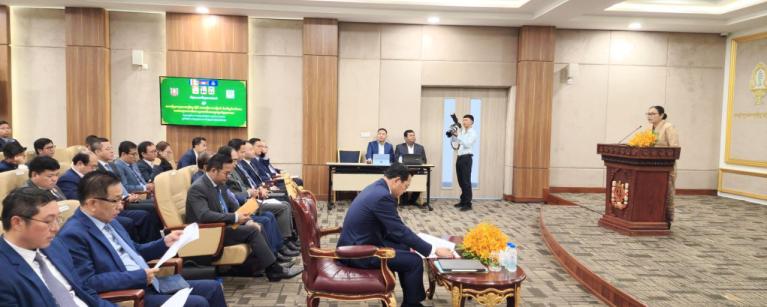Today, the Ministry of Justice is organizing a consultative workshop on the draft Royal Decree on "The establishment, organization, and functioning of the National Authority for Alternative Dispute Resolution." The purpose of the workshop is to provide an opportunity for all stakeholders to share their inputs and feedback, with the aim of ensuring that the Royal Decree is meaningful and implementable.
The establishment of an Alternative Dispute Resolution (ADR) mechanism alongside the existing framework is intended to expedite the resolution of disputes, particularly those affecting local community. This draft Royal Decree, which is being discussed will become an important legal instrument and a guidance for compiling and making other legal instruments for the development and implementation of ADR with effectiveness, equality, and inclusiveness. Oxfam warmly welcomes the ministry of justice under the leadership of His Excellency Deputy Prime Minister who shares far-sighted vision on judicial reforms in Cambodia with the aim to efficiently and timely resolve civil disputes and provide justice to disputants.
Oxfam National Director, Ms. Sophoan Phean, said: “Oxfam has been working with the Ministry of Justice since 2021 to bring access to justice services closer to the communities. We firmly hope that today’s consultative workshop will gather significant and practical inputs to advance a fair society free from poverty and achieve the new government’s pentagon strategic goals.”
The consultation workshop today has 150 participants from government ministries, development partners, civil society organizations and other stakeholders. The workshop featured presentation on ADR in Cambodia and the region’ experiences, the establishment, organization, and functioning of the National Authority for Alternative Dispute Resolution royal degree, and the criteria of selecting the officials in charge of the ADR mechanism by the Ministry of Justice. In the afternoon, there will be an open discussion on the establishment of the royal decree and other key areas presented during the day.
In early 2013, with the financial support from the European Union, Oxfam and our partners worked on a project called EU-Cambodia Co-operation Facility for Governance and Human Rights-ECCF, which supported 240 villages in Kampong Thom, Preah Vihear, Kratie and Stung Treng provinces. The primary objective was to strengthen the partnership between sub-national authorities and the communities they serve. The project facilitated the establishment of Access to Justice Committees for the Poor (AJCs) and the provincial-level Cambodia Land and Environment Action Network (CLEAN). The implementation of the project has brought learning and recognition that alternative dispute resolution mechanisms are needed to bring accessible justice services closer to the people.
Oxfam will maintain its collaboration with the ministry of justice to develop new legal instruments. Additionally, Oxfam will actively engage with local and international civil society organizations involved in legal and judicial assistance, and together we will contribute to strengthening, improving quality and effectiveness of justice system in Cambodia.
Content sections
